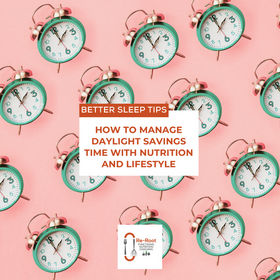
Top 7 Foods to Eat and Avoid for Optimal Sleep Quality
As a functional nutrition coach, I strongly believe that what we eat and what lifestyles we practice have a profound impact on our overall health, including the quality of our sleep.
Poor eating habits and unhealthy food choices can disrupt our sleep patterns and lead to sleep deprivation, which can negatively affect our physical and mental well-being.
On the other hand, eating the right foods can promote optimal sleep quality and help us feel more rested and refreshed.
In this blog post, I will share with you the top 7 foods to avoid and the top 7 foods to eat to promote optimal sleep quality.
Top 7 Foods to Avoid That Disturb Your Sleep Quality
1). Caffeine
Caffeine is a powerful stimulant that can keep you awake and alert for hours. It is found in coffee, tea, energy drinks, and some soft drinks. Avoid consuming caffeine at least 4-6 hours before bedtime. Ideally, try stopping by 1 pm at the latest to be sure it's out of your system before you go to bed.
2). Alcohol
While alcohol can make you feel drowsy and relaxed, it disrupts the natural sleep cycle and can lead to poor-quality sleep. It is best to avoid alcohol consumption at least 2-3 hours before bedtime.
3). Spicy Foods
Spicy foods can cause heartburn, indigestion, and stomach discomfort, which can disrupt your sleep. Avoid eating spicy foods before bedtime.
4). Sugary Foods
Sugary foods can cause a spike in blood sugar levels, leading to energy crashes and sleep disturbances. Avoid consuming sugary foods, especially before bedtime.
5). High-Fat Foods
High-fat foods, such as fried foods, can cause bloating and indigestion, which can affect your sleep quality. It is best to avoid high-fat foods, especially before bedtime.
6). Processed Foods
Processed foods, such as chips, crackers, and cookies, are often high in sugar, salt, and unhealthy fats. These foods can disrupt your sleep and lead to poor overall health. It is best to avoid processed foods altogether.
7). Red Meat
Red meat is high in protein and can be difficult to digest, which can lead to digestive issues and disrupted sleep. It is best to avoid consuming red meat, especially before bedtime.
Top 7 Foods to Eat to Promote a Restful Nights Sleep
1). Tart Cherry Juice
Tart cherry juice is high in melatonin, a hormone that regulates sleep-wake cycles. Consuming tart cherry juice before bedtime can promote optimal sleep quality.
2). Warm Milk
Warm milk contains tryptophan, an amino acid that promotes sleep. Consuming warm milk before bedtime can help you feel relaxed and ready for sleep.
3). Bananas
Bananas are high in magnesium and potassium, which can help relax muscles and promote optimal sleep quality. Consuming a 1/2 - 1 banana before bedtime can help you feel calm and ready for sleep.
4). Whole Grains
Whole grains, such as brown rice and whole-wheat bread, are high in fiber and complex carbohydrates, which can help regulate blood sugar levels and promote optimal sleep quality. Consuming whole grains during the day can help you feel more energized and ready for sleep at night.
5). Leafy Greens
Leafy greens, such as spinach, arugula, dandelion greens, and kale, are high in magnesium, which can help promote relaxation and optimal sleep quality. Consuming leafy greens during the day can help you feel more relaxed and ready for sleep at night.
6). Herbal Tea
Herbal teas, such as chamomile and valerian root, have natural sedative properties that can promote relaxation and optimal sleep quality. Consuming herbal tea before bedtime can help you feel calm and ready for sleep. Try not to drink after 7 pm so that you don't have to get up and pee in the middle of the night.
7). Fatty Fish
Fatty fish, such as salmon, mackerel, anchovies, and sardines, are high in omega-3 fatty acids, which can help regulate sleep-wake cycles and promote optimal sleep quality. Consuming fatty fish during the day can help you feel more rested and ready for sleep at night.
Now that you know the top 7 foods to avoid and the top 7 foods to eat to promote optimal sleep quality, it's time to start incorporating these foods into your diet.
Remember, healthy eating habits are essential for a good night's sleep, and small changes can make a big difference.
Also following an anti-inflammatory Mediterranean-based diet can help to support your sleep as it's rich in the foods mentioned above, plus it includes nuts, seeds, extra virgin olive oil, red wine, and many vegetables all of which naturally contain melatonin.
By eating these foods and following an anti-inflammatory lifestyle you can learn to sleep better again.
https://www.ncbi.nlm.nih.gov/pmc/articles/PMC9951922/?utm_source=Iterable&utm_medium=email&utm_campaign=long_game_newsletter_20230317&mbg_mcid=6416559&mbg_hash=448d52f1e2598476987e0452e4968094
Recipe: Quinoa and Veggie Stir Fry
As a bonus, here's a recipe for a delicious and sleep-promoting entree that you can try at home:
Recipe: Anti-Inflammatory Mediterranean Quinoa and Veggie Bowl
Ingredients:
- 1 cup organic quinoa
- 2 cups filtered water
- 2 tbsp organic extra virgin cold-pressed olive oil
- 2 cloves organic garlic, minced
- 1 organic onion, chopped
- 1 organic red bell pepper, chopped
- 1 organic yellow squash, chopped
- 1 organic zucchini, chopped
- 2 cups organic baby spinach
- Sea salt and pepper to taste
Instructions:
- Rinse the quinoa and add it to a pot with 2 cups of water.
- Bring to a boil, then reduce the heat and let it simmer for 15-20 minutes, or until the water has been absorbed.
- Heat the olive oil in a large skillet over medium-high heat.
- Add the garlic and onion and saute until the onion is translucent.
- Add the bell pepper, squash, and zucchini, and saute for 5-7 minutes, or until the vegetables are tender.
- Add the baby spinach and stir until it has wilted.
- Add the cooked quinoa to the skillet and stir until everything is well combined.
- Season with salt and pepper to taste.
This recipe contains several ingredients that are beneficial for promoting quality sleep:
1). Quinoa:
Quinoa is a whole grain that contains high levels of magnesium, which is important for promoting sleep. Magnesium helps to relax muscles and calm the mind, making it easier to fall asleep and stay asleep.
2). Vegetables:
The recipe includes several vegetables, such as spinach, bell peppers, zucchini, and squash, which are rich in vitamins and minerals that support healthy sleep. These vegetables contain antioxidants, which can help to reduce inflammation and promote relaxation.
3). Extra Virgin Olive oil:
Extra virgin olive oil is a healthy fat that is rich in oleic acid, which has been shown to improve sleep quality. Oleic acid can help to reduce inflammation and promote relaxation, making it easier to fall asleep and stay asleep.
4). Garlic and onion:
Garlic and onion are both rich in antioxidants and other compounds that can help to reduce inflammation and promote relaxation. These ingredients can also help to boost the immune system and promote overall health, which can contribute to better sleep quality.
Overall, this recipe contains a variety of nutrient-dense ingredients that can help to promote relaxation, reduce inflammation, and support healthy sleep.
Enjoy it for dinner, and you'll be on your way to a better night's sleep.
By avoiding the top 7 foods that can disrupt your sleep and incorporating the top 7 foods that promote optimal sleep quality into your diet, you can take control of your sleep patterns and enjoy better health and well-being.
Remember to make small, sustainable changes to your diet and lifestyle, and you'll be on your way to a more restful night's sleep.
Ready to learn more about how to improve your sleep quality and quantity by focusing on the Mediterranean-based lifestyle?
Check out my website at https://rerootnutritioncoach.com/ to learn more about my practice.
Click https://p.bttr.to/3kiqI71 to schedule your free 30-minute discovery call with Joseph Bershad at Re-Root Functional Nutrition Coaching to learn about my nutrition coaching programs to help kick your chronic inflammation to the curb, and have you sleeping like a baby again.
You've got this!
#rerootnutrittioncoach #sleepquality #nutritioncoach #foodforhealth #sleeptips #functionalnutrition #healthyeatingtips #healthysleep #nutritiontips #sleepbetter #sleepwell #sleepcoach #sleepcoaching #foodismedicine
References:
- Drake, C., Roehrs, T., Shambroom, J., & Roth, T. (2013). Caffeine effects on sleep taken 0, 3, or 6 hours before going to bed. Journal of clinical sleep medicine, 9(11), 1195-1200.
- Ebrahim, I. O., Shapiro, C. M., Williams, A. J., & Fenwick, P. B. (2013). Alcohol and sleep I: effects on normal sleep. Alcoholism: Clinical and Experimental Research, 37(4), 539-549.
- Huang, C. W., Tung, T. H., & Chiang, S. C. (2011). Sleep quality in middle-aged and elderly Taiwanese: roles of diet and lifestyle. Sleep and breathing, 15(4), 619-625.
- St-Onge, M. P., & Roberts, A. L. (2016). Sleep and its relationship to weight and metabolism. In Advances in Nutrition (Vol. 7, No. 3, pp. 341-349). Oxford University Press US.
- Afaghi, A., O'Connor, H., & Chow, C. M. (2007). High-glycemic-index carbohydrate meals shorten sleep onset. The American journal of clinical nutrition, 85(2), 426-430.
- Chen, J. H., Chuang, L. M., & Chen, R. Y. (2012). Sleep duration and health-related behaviors among high-school students in Taiwan. Sleep and Breathing, 16(3), 729-736.
- Halson, S. L. (2014). Sleep in elite athletes and nutritional interventions to enhance sleep. Sports medicine, 44(Suppl 1), 13-23.
- Howatson, G., Bell, P. G., Tallent, J., Middleton, B., McHugh, M. P., & Ellis, J. (2012). Effect of tart cherry juice (Prunus cerasus) on melatonin levels and enhanced sleep quality. European journal of nutrition, 51(8), 909-916.
- Peuhkuri, K., Sihvola, N., & Korpela, R. (2012). Diet promotes sleep duration and quality. Nutrition research, 32(5), 309-319.
- Centers for Disease Control and Prevention. (2016). Omega-3 Fatty Acids. Retrieved from https://www.cdc.gov/nutrition/essentials/omega-fatty-acids/index.html







